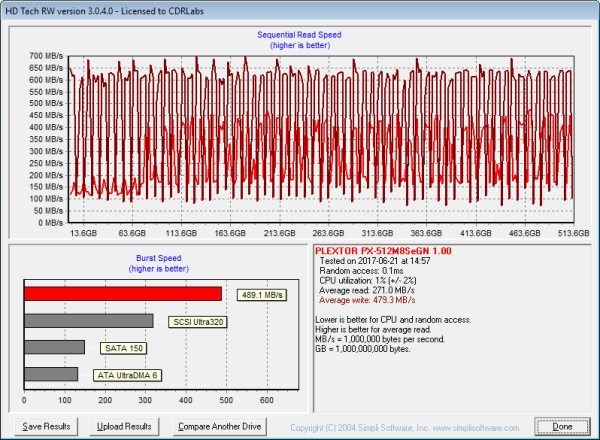TRIM Performance:
While SSD's offer many benefits, there are some downsides to using flash memory. One of the biggest issues people run into is performance degradation. Over time, an SSD will run out of fresh blocks and will have to write over data the file system has marked as deleted. This procedure is very complicated and can slow an SSD's write speeds considerably.
To fix this problem, most manufacturers have added TRIM support to their SSDs. The TRIM command allows an operating system, such as Windows 7, to tell an SSD which data blocks are no longer in use. Using this information, the drive pro-actively erases these blocks and adds them to the free block pool.

To test the M8Se's TRIM and garbage collection functions, I first put the drive in a "dirty" state. I used Iometer to fill the entire drive and then ran a random write test for 30 minutes. Looking at the screenshot below, you can see that the M8Se's average read and write speeds dropped to 140.7 MB/s and 477.4 MB/s, respectively.

Plextor M8Se - Dirty
To see how well the M8Se could recover, I let the computer sit for about 30 minutes and then reran the test. The drive's average write speed climbed up to 479.3 MB/s. However, its read speed lagged behind, averaging out at only 271.0 MB/s.

Plextor M8Se - After TRIM
Lastly, I used Parted Magic to perform a secure erase on the M8Se. With the drive wiped clean, it had average read and write speeds of 1393.2 MB/s and 629.0 MB/s, respectively.

Plextor M8Se - Secure Erased
Final Thoughts:
The Plextor M8Se is a great choice for the budget-conscious gamer looking to put an NVMe SSD in their notebook or desktop computer. Available with or without a heatsink, this M.2 form factor SSD is powered by Marvell's 88SS1093 controller and is available with up to 1TB of Toshiba's 15nm TLC NAND flash. Combine this with Plextor's PlexNitro technology and a PCIe Gen3 x4 NVMe 1.2 interface and you have a drive capable of delivering four times the read and twice the write performance of your average SATA 6Gb/s SSD. In our sequential read and write tests, the M8Se was able to read at speeds as high as 2,481 MB/s and write at speeds in excess of 1,004 MB/s. The drive also did relatively well in our random write tests, producing more than 104,000 IOPS at low queue depths.
While Plextor's PlexNitro technology works well under normal workloads, it does have its limitations. If you have a heavy workload, where a consecutive write operation exceeds the size of the SLC cache, the M8Se's write speed drops to non-accelerated levels. I also found this cache to be quite small. With the 512GB version of the M8Se I wasn't able to write more than about 5GB worth of data before it filled. Given, this won't be an issue for the consumer or gamer looking to speed up load times, but, if you have heavier workloads, you may want to consider Plextor's M8Pe SSD.
The M8Se is available now in 128GB, 256GB, 512GB and 1TB capacities. However, here in the US, Newegg is the only retailer with the drive in stock and they appear to be charging a premium for it. They currently have the M8Se priced the same or, in some cases, higher than the better performing M8Pe. According to Plextor, the actual suggested retail prices range from about $77 up to $462 with the M.2 version reviewed here going for about $240. Needless to say, you'll want to wait for Newegg to lower their prices (Update: Newegg has lowered the price of the M8Se) or wait for retailers like Amazon to get the M8Se in stock.

Highs:
- PCIe 3.0 x4 interface with NVMe protocol
- Equipped with Toshiba TLC NAND
- Available in 128GB, 256GB, 512GB and 1TB capacities
- Good sequential and random read and write performance
- PlexNitro technology optimizes performance without taking up SSD space
- Supports True Speed and True Protect technologies
- M.2 2280 and HHHL PCIe form factors
- Large DRAM cache
- Competitively priced
- 3 year warranty
Lows:
- Write speed drops when SLC cache is full
- SLC cache is small
- Not supported by Plextor's PlexTool software
- Does not support hardware based encryption

